 I just love hearing stories of how churches have special liturgies or ceremonies to honor people’s work lives. Of course, some do this during the Labor Day season; more than once I’ve helped organize litanies as people brought to the front of the church items from their workplace.
I just love hearing stories of how churches have special liturgies or ceremonies to honor people’s work lives. Of course, some do this during the Labor Day season; more than once I’ve helped organize litanies as people brought to the front of the church items from their workplace.
 The great new book that I mentioned last week, A Moveable Feast: Worship for the Other Six Days (ImaginationPlus; $12.00) by our friend Terry Timm, offers a whimsical, smart, and inspiring theology of worship that realizes and develops the inherent relationship between corporate Sunday worship and our various offices and tasks to which we are called on weekdays. (In fact, there is a wonderful appendix that offers an entire service around the themes of work, with worship aids, prayers and litanies and such.) It might be worthwhile Labor Day meditation for some of you.
The great new book that I mentioned last week, A Moveable Feast: Worship for the Other Six Days (ImaginationPlus; $12.00) by our friend Terry Timm, offers a whimsical, smart, and inspiring theology of worship that realizes and develops the inherent relationship between corporate Sunday worship and our various offices and tasks to which we are called on weekdays. (In fact, there is a wonderful appendix that offers an entire service around the themes of work, with worship aids, prayers and litanies and such.) It might be worthwhile Labor Day meditation for some of you.
Mainline denominational churches, it seems, were hot on this topic twenty or thirty years ago (with good books by standard denominational publishers.) Now, evangelicals have been the most thoughtful and — to use the overused word — robust in promoting a uniquely Christian view of work, based on a mature theology of calling and vocation, drawing on themes such as common grace, public faith, the renewal of institutions, the dignity of labor, and the common good. From Os Guinness’ seminal and still essential, eloquent volume The Call: Finding and Fulfilling Your Life’s Purpose (Thomas Nelson; $17.99) to the exceptionally insightful book co-written by Timothy Keller and Katherine Leary Alsdorf, Every Good Endeavor: Connecting Your Work to God’s Work (Dutton; $16.00), we have seen in the last decade or so a remarkable consensus of the importance of themes of calling and vocation, leading to intentional reflection on the meaning of labor and the spiritual practices needed to be faithful and fruitful in the work-world.
I have written here about why all this is so vital and exciting for us (check out that live James Taylor video doing “Millworker” this Labor Day!) Here is a piece I wrote about this topic, inspired after a forum on faith & work here in our area with Steve Garber. Here is a piece I wrote after one of the Redeemer Presbyterian Center for Faith & Work annual conference. (I hope you find the rumination and reviews helpful, but the special sale announced there is over.)
Here is a large bibliography on vocation and work that I did a few years ago which some have found helpful. It is one of the most-visted pages at our website, I gather.
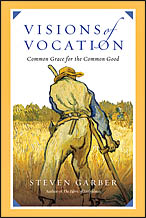 Through many, many of these conversations and in the development of new ministries, non-profits, think-tanks and publications from coast to coast, there has been one person, our good friend Steve Garber, author of Visions of Vocation: Common Grace for the Common Good (IVP; $16.00; our sale price = $12.80.)
Through many, many of these conversations and in the development of new ministries, non-profits, think-tanks and publications from coast to coast, there has been one person, our good friend Steve Garber, author of Visions of Vocation: Common Grace for the Common Good (IVP; $16.00; our sale price = $12.80.)
Steve has encouraged city-wide organizations helping professionals think and serve faithfully in their varied professions, and has helped seminaries develop curriculum to equip pastors to think about their priestly work among workers. I have written before how he has been influential in my own life,and my small connection to his earlier book. He has been influential, and especially among our friends in Pittsburgh who run the Jubilee conference for college students. I know there are other strategic leaders and authors, but Steve has nurtured relationships and conversations around themes of caring for God’s world, taking up our places in various spheres and careers, that have been transformative and consequential. He has been showing up behind the scenes in church basements and coffee shops, workshop rooms, or retreat center spaces for years, inviting people to deeper discipleship, thoughtful, relevant orthodoxy, and an “all of life redeemed” sort of wholistic Kingdom vision.
Garber’s reputation as a mature thinker, eloquent speaker and author, and a caring friend and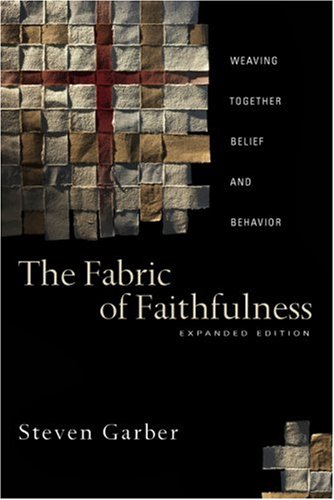 teacher grew nation-wide after the publication of his much-acclaimed book about the years beyond higher education called The Fabric of Faithfulnness: Weaving Together Believe and Behavior (IVP; $17.00; our sale price = $13.60) In that book he uses pop culture and heady philosophers and cultural critics to ask the huge questions of those trying to figure out the meaning of their lives: what does it mean to know something, and how can I keep on, with Christian convictions lived out with character and integrity, in community with friends. I has been very positively reviewed and is esteemed by very reliable authors and leaders. The new Visions of Vocation book has echoes of similiar themes, and in some ways it is a sequel. Yet, it seems more accessible, and will surely attract a broader audience. I think VoV is a good place to start if you haven’t worked through FoF.
teacher grew nation-wide after the publication of his much-acclaimed book about the years beyond higher education called The Fabric of Faithfulnness: Weaving Together Believe and Behavior (IVP; $17.00; our sale price = $13.60) In that book he uses pop culture and heady philosophers and cultural critics to ask the huge questions of those trying to figure out the meaning of their lives: what does it mean to know something, and how can I keep on, with Christian convictions lived out with character and integrity, in community with friends. I has been very positively reviewed and is esteemed by very reliable authors and leaders. The new Visions of Vocation book has echoes of similiar themes, and in some ways it is a sequel. Yet, it seems more accessible, and will surely attract a broader audience. I think VoV is a good place to start if you haven’t worked through FoF.
So, again, this new book — which we helped launch into the world at Jubilee in February — is called Visions of Vocation: Common Grace for the Common Good. I had the great privilege of reading an early manuscript and so knew how very good the book was before it was released. We confidently announced as we took pre-orders last winter that it would doubtlessly be the 2014 “Book of the Year” and I have no reason, now more than a half a year later, to back down from that big claim. There are some fantastic books that have come out this year, but this truly is the most eloquent, wise, interesting, stimulating, and valuable book I’ve read in years. It surely will be the Hearts & Minds Book of the Year.
VoV speaks volumes of Steve’s long obedience in the same direction as he pursues his own calling to be a raconteur and traveling professor and friend to many, helping folks “weave together believe and behavior” as they consider their own tasks and callings and places to serve.
You know that famous Buechner quote about our vocations being that place where “your deep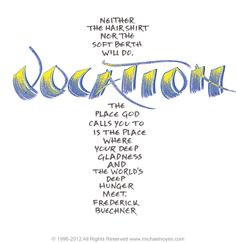 gladness and the world’s deep hunger meet”? Garber agrees, it seems, that “neither the hair shirt nor the soft berth will do” and he helps people explore that, day by day by day and although he doesn’t say so, Visions of Vocation could be seen as an extended mediation on that potent quote.
gladness and the world’s deep hunger meet”? Garber agrees, it seems, that “neither the hair shirt nor the soft berth will do” and he helps people explore that, day by day by day and although he doesn’t say so, Visions of Vocation could be seen as an extended mediation on that potent quote.
I could ramble for way too long about the merits of this exceptional book, or citing the rave, rave views on the cover and inside pages (wow!) but instead I will be relatively focused, naming four things I like about it, things that I think will benefit you as a serious reader.
THE FIRST REASON
If you are familiar with the language we often use here — the integration of faith and learning, a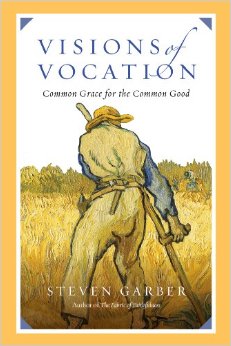 wholistic Kingdom vision, the unfolding story of God’s redeeming work in the world, taking faith into public life — you will know that Garber’s worldview and vision are consistent with (in fact has helped shape) our perspective here. I hope you know I am sincere when I say that if you appreciate our work at the bookstore, our curating of books at events, and these BookNotes reviews, you should get this book!
wholistic Kingdom vision, the unfolding story of God’s redeeming work in the world, taking faith into public life — you will know that Garber’s worldview and vision are consistent with (in fact has helped shape) our perspective here. I hope you know I am sincere when I say that if you appreciate our work at the bookstore, our curating of books at events, and these BookNotes reviews, you should get this book!
That is the first thing. Steve, without using much of the breathy rhetoric and lingo to which I so often resort, stands in the tradition(s) that have helped evangelicals learn to speak so passionately about cultural engagement, social change, and a long-term vision of living with integrity “in the world but not of it.” He reads Kuyper, Al Wolters, N.T. Wright, writes for Comment magazine, The High Calling blog and more. Steve is humble, increasingly an older, capable friend to rising leaders, trusted because he himself has been guided by some of the best evangelical leaders of the previous generation, those that have held together solid theology, deep piety and prayer, and a non-partisan, sensible, radical Christian view of life and times. From Francis Schaeffer and Os Guinness to J.I. Packer and John Stott, Steve has been informed by lasting friendships with important leaders.
And, he reads widely, carefully, delightfully, even, awed, often, by good lines from Dickens and Marx, Walker Percy and Camus, Chaim Potok and Wendell Berry, the contemporary novels of Thomas Wolfe and classics like Victor Hugo and, always, the poetry of Steve Turner. For those who want to know these things, he often cites Church of South India missionary Leslie Newbigin and Jewish Biblical scholar Abraham Heschel. I love a guy who quotes Dutch Calvinist Geerhardus Vos and the famous British Archbishop Rowan Williams, the Lutheran intellectual Jean Bethke Elshtain and the poetry of Madeline L’Engle.
So, Garber gets it. God cares about all of life, we must move from thinking about worldviews to embodying restorative ways of life, and we do that over a lifetime of being shaped by worship and Word, reading and talking, slowly and carefully, drinking deeply from the deepest wells, renewed so that we can be the people God calls us to be in this creation being restored.
SECONDLY
Secondly, not only does Steve’s book call us to this wide-as-life, creation-regained worldview that pushes us to discern our vocations and callings and take up our places in the work God gives us to do, but he does this heavy lifting with eloquence and real tenderness. He is an excellent writer, knowing how to develop a theme with quotes and stories, Scripture and song, drawing on older authors and the latest sociology, pacing things just so with some sophisticated analysis and some charming prose.
For those who just love a good book, this quite simply is one of the best.
There are many books these days written with whimsy and upbeat energy. These are cool and fun and commendable, especially for younger readers or those who need the hip banter and jokes to keep their interest. But these titles and their authors, I’m afraid, will not last, and will not guide us very deeply, not for a lifetime. On the other hand, I hardly have to say that dense, stodgy works that are dusty and dry don’t help many of us very much, either.
G arber strikes a balance, with his gifted style, his deep knowledge, his mature guidance, and his very stimulating stories, richly told. He delightfully cites movies, mentions meetings with pop icons and rock stars. U2, Mumford & Sons, Dave Matthews Band, are quoted. He exegetes poems and rock songs and films, always offering exceptional insight, gifted as he is at doing these things. He doesn’t just cite a star so he can seem hip to a demographic, or because some editor asked him to lighten up. Steve is one of the most naturally gifted discerners of popular culture who can speak with profundity and intellectual acumen, keeping a foot properly planted in what some call the real world.
arber strikes a balance, with his gifted style, his deep knowledge, his mature guidance, and his very stimulating stories, richly told. He delightfully cites movies, mentions meetings with pop icons and rock stars. U2, Mumford & Sons, Dave Matthews Band, are quoted. He exegetes poems and rock songs and films, always offering exceptional insight, gifted as he is at doing these things. He doesn’t just cite a star so he can seem hip to a demographic, or because some editor asked him to lighten up. Steve is one of the most naturally gifted discerners of popular culture who can speak with profundity and intellectual acumen, keeping a foot properly planted in what some call the real world.
So that’s the second thing: he not only gets the big picture of the Biblically-saturated mind and the way toward a reformingly Christian perspective, he writes really well, striking a rare balance between serious insight and great stories. I truly believe this to be one of the best written non-fiction books of applied theology I’ve seen in a long while. I know that Steve poured his heart into this manuscript for years and years, not rushing to complete it, letting his life and words simmer so they sounded out truth truly and nicely.
THIRD: A MAJOR THEME
Thirdly, besides the perspective and the prose: I think this book strikes an amazing tone of joy and sorrow, of idealism and realism, of honesty and hope. Books like this are all too rare. Many religious books are glib, happy-clappy, or superficial in their positivity. (There are also those that are so harsh and hard that, while beneficial, can be almost too somber or angry, creating agitation in the reader, not wisdom and hope.) So the third strength of this book is how it handles the hard stuff of our lives and our world.
Actually, this is a major theme of Visions of Vocation. That is, it is not just another rumination on the doctrine of calling or the joy of a purpose driven life or a rousing call to make a difference. It isn’t mostly about labor and the work-world, even though that is a large part of the consulting and teaching he does through his remarkable Washington Institute on Faith, Vocation and Culture. If it has “vocation” in the title, but isn’t a book mostly about callings and careers, exactly, what then does he mean by the title?
I think it is mostly this: we are, indeed, called by a covenant-making God who initiates redemptive work in our lives, recruiting us for God’s own purposes in the world. That invitation — that call to us — comes with a large consequence: like Jesus, the incarnate One who models this very calling to serve God, to pray and live “thy Kingdom come, on Earth,” we are called to behold the world, and realize its deep sorrow. This is our vocation: to care for the world as God does, to love, to take upon ourselves some of the aches of our time. If we are not to grow jaded or cynical or apathetic or pessimistic, we will simply have to figure out how to love well despite disappointment. Although not a cheap “self help” book,VoV will help you do that.
I recall years ago, in a story that is hinted at inVoV, Steve shared how when he and his wife were first married, and she got to know him more intimately, privately, learning of his deepest flaws and foibles, he wondered if, knowing who he really is, could she continue to love him. That is a very fundamental question for us all, isn’t it? Once we are known, we wonder if people will still love us as much as they did before they saw us as the broken, stupid sinners that we are. And what kind of a person can do that?
And so it goes, as we are called to care about the world, to serve God in the world, to be Christ’s agents of change in the culture, to take up our own place in the choir, even as we find out that it isn’t as easy as we thought. It is messy. Change the world? I can hardly change my attitude. Make a difference in politics or business or media or medicine? I can hardly make a difference in my own skin or my own family. It’s a bumpy ride, this journey to live well in a screwy world, and Garber thinks we need a strong and lasting sense of vocation to withstand the tendencies to grow cold, to care less, to give up. We need to internalize deep and solid and fruitful visions of vocation, knowing just what we are called to do and be.
attitude. Make a difference in politics or business or media or medicine? I can hardly make a difference in my own skin or my own family. It’s a bumpy ride, this journey to live well in a screwy world, and Garber thinks we need a strong and lasting sense of vocation to withstand the tendencies to grow cold, to care less, to give up. We need to internalize deep and solid and fruitful visions of vocation, knowing just what we are called to do and be.
So, this book, unlike almost any other, gets us to think about what we most care about, how we choose to live, in light of various images and ideas about our calling into the world. Can we know the world, and still care? Can we care and not burn out? Can our relationship with the rabbi Jesus help us shed tears like He did, to flare up in righteous anger as He did, in holiness and mercy, to reach out and heal hurts, in some way, as he did? Can we be Christ-like image-bearers even in our public lives, in the spheres of influence where we spend our dollars and our days?
As Steve asks, more than once in this profound book, knowing what I know, what will I do?
That question really is the heart of the book.
I mentioned that he tells good stories, and that they aren’t cheap little inspirational nuggets gathered from some writer’s anthology of neat illustrations. Steve walks alongside people — medical researchers stationed in Africa, movies stars stationed in LA, college students stationed in Ivy Leagues colleges, mothers pondering the art and vocation of caring for families — and the stories he tells of them are inspiring and, frankly, somehow extraordinarily meaningful. He has a way of underscoring and illuminating the dignity and meaning of the struggles of these brave folks to serve God where they are, even in their own brokenness. I cannot put my finger on it, but Garber sees into the holy reality of these friends of his, and tells their stories in ways that capture dignity and purpose.
From his pals in Jars of Clay (and their Blood:Water Mission) to his friend Hans who started an environmentally-sensitive burger chain using organic ingredients and grass-fed cattle to a Korean friend who works at the World Bank to a Lawrence, Kansas, carpenter guy, a former student of his who now owns his own small construction business, rebuilding homes with integrity, stories are shared as examples of people who are intentional about their live’s callings and the fidelity needed in that arena or responsibility. In each case, these folks have stepped into a way of doing their work that starts with deep knowing. He describes one as a person with “a seriousness about things that matter and a softness of heart.”
environmentally-sensitive burger chain using organic ingredients and grass-fed cattle to a Korean friend who works at the World Bank to a Lawrence, Kansas, carpenter guy, a former student of his who now owns his own small construction business, rebuilding homes with integrity, stories are shared as examples of people who are intentional about their live’s callings and the fidelity needed in that arena or responsibility. In each case, these folks have stepped into a way of doing their work that starts with deep knowing. He describes one as a person with “a seriousness about things that matter and a softness of heart.”
One story he briefly tells is of a school teacher who struggled with the deep implications for education found in C.S. Lewis’ The Abolition of Man. Another is of a white South African, now in the states, who tells of his journey towards political action for public justice by his regular reading of the Psalms; yet another friend he tells us about is an Anglican priest who is recasting his vision of ministry, learning to be a pastor to people who take their work and public life seriously. Another couple has a gift of hospitality, serving good wine with good laughter among friends and guests.
Of them, Steve writes, “People who keep at their callings for a lifetime are always people who suffer. The world is too hard and life too broken for it to be otherwise. And that is true for Deirdre and Claudius.” After describing some of their illnesses and surgeries and hardships, Garber continues, “But they live with gladness and singleness of heart, which at the end of the day is the best that any of us can do.”
As he reflects on this couple and the witness of their lives, he writes,
Their life for others is a window into the meaning of common grace for the common good. From the hospitality of their table to the way they live in their neighborhood to the work that is theirs in the worlds of law and psychology, they have chosen vocations that give coherence, making sense of what they believe about God and the human condition, and have unfolded habits of heart that are a grace to the watching world.
FOURTH: BEING A GRACE FOR THE WORLD
I suppose this captures the fourth reason I think Visions of Vocation: Common Grace for the Common Good is such a stellar book, a wise gift to us all, a work well worth reading. It offers an exceptional idea, really: that the Christian life is to be offered for the watching world, as a grace, as he puts it. It may not come as a surprise that Garber has been influential among those who made the popular For the Life of the World DVDs that I have raved about here. The title of that video series is an answer to the question “What is our salvation for?” Interesting, isn’t it?
“A grace for the watching world”, he says.
I know there is much written these days about a gospel-centered life, about the doctrine of grace, both as it helps us understand the work of Christ’s cross (for our justification and sanctification) and as a style of nonjudgmental living, a gracious shift away from legalism. Yes, yes, we need gospel-drenched teachings. But Garber talks also about what some call “common grace” which is to say that God (in patience and mercy) upholds the creation for all creatures under the sun, and all of life somehow can point us towards the truth of the God who is there, and the sustainable abundance of life as it was meant to be. We can happily live in the real world, spending our ordinary days, in our ordinary occupations, knowing of God’s presence we can offer grace to a needy world. Perhaps our gift will be mundane; in our day to day we will learn to incarnate goodness, showing forth lives that embody meaning. In other words, living well for the sake of the world, because of God, makes sense, unfolds the meaning of our days. I think that may be close to what Garber means by a call to coherence — to craft lives that makes sense because the gospel is true.
know there is much written these days about a gospel-centered life, about the doctrine of grace, both as it helps us understand the work of Christ’s cross (for our justification and sanctification) and as a style of nonjudgmental living, a gracious shift away from legalism. Yes, yes, we need gospel-drenched teachings. But Garber talks also about what some call “common grace” which is to say that God (in patience and mercy) upholds the creation for all creatures under the sun, and all of life somehow can point us towards the truth of the God who is there, and the sustainable abundance of life as it was meant to be. We can happily live in the real world, spending our ordinary days, in our ordinary occupations, knowing of God’s presence we can offer grace to a needy world. Perhaps our gift will be mundane; in our day to day we will learn to incarnate goodness, showing forth lives that embody meaning. In other words, living well for the sake of the world, because of God, makes sense, unfolds the meaning of our days. I think that may be close to what Garber means by a call to coherence — to craft lives that makes sense because the gospel is true.
We take up our human calling to care and we find ourselves complicit and responsible; therein lies the beauty and the joy. We can, in Christ’s power, take steps to reverse the curse, to live for better things, to actually do what we know. Words can become flesh.
Garber writes,
The Hebrew vision that echoes across the centuries through culture offers a different way to be human, where knowing becomes doing. And the Christian vision incarnates this conviction, telling the story of the Word become flesh, and of words becoming flesh in and through our vocations. This vision calls us to know and to care about what we know; in fact to love what we know. And, strange grace that it is, it becomes possible to know without becoming disillusioned, to know the worst and to still love – not only people, but the world in which we live. We will never do that perfectly, only proximately, at our very best. But in this now-but-not-yet- moment in history, that is enough.
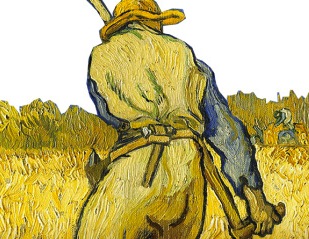 Here, then, a quick summary.
Here, then, a quick summary.
FOUR GOOD REASONS TO BUY Visions of Vocation: Common Grace for the Common Good. And we have it at 20% off, too, a reason I hardly need to mention.
1. 1. It is one more very good example of a growing body of literature about cultural engagement, about serving God in the world, especially in our work, and this big picture of how to imagine the Kingdom coming — moving from worldview to way of life — is timely, important, and offers insights into the best way to live out daily discipleship. If you like books about a Christian worldview (and I hope you do!) this is great. If, however, you don’t resonant with that word, this book is really great — I don’t recall that he uses the W word at all. Steve’s ecumenical, orthodox vision is broad and important, a transforming vision.
2. 2. Visions of Vocation is very well written, eloquent and inspiring, without being cheap or glib. The stories are well-told, offering important clues into lives well-lived, but aren’t so dramatic or historic that we cannot relate. This is a beautifully-crafted book, profound and realistic, even as it is written with a seriousness of vision and an exceptional command of language. The sentences are good, the paragraphs and pages sometimes sublime. One reviewer said “love and vulnerability exudes from every page.” I think the artful cover even hints at this: this is a beautifully-done book to own and to share.
3. 3. The heart of VoV, like FoF before it, is profound and vital, and something we just don’t hear much: not only are we invited to be agents of Kingdom transformation, serving Christ in all areas of life, but to do this will inevitably cause us to suffer. In fact, the deepest meaning of our human-ness is to know how to be responsible in a complex, broken world. Can we love well, even knowing what we know? Will we resist the tendency to sell out, burn out, or to grow cynical or apathetic? I predict that 20 years from now, some people will report that the reading of this book was one thing that helped them keep the faith, in part because it was honest about the human condition and the state of the world. To say it is realistic about our pain and the agonies of the world is a deep, good thing, and sets it apart, even making it urgent.
4. Visions… points us to coherence, to a meaningful life that makes sense, a way of being that is sane and good and full of faith, hope and love. That is, it is an uncommon grace to us; God will use it to inspire you as you realize how you serve the common good. As you care about the world you will thereby find ultimate meaning: loving God and loving neighbor. Put simply, I am sure this rich book will help you discover a depth of meaning and significant coherence to the story of your life and will help you flourish, yes, for the sake of the world.

BookNotes
DISCOUNT
ANY ITEM MENTIONED
20% off
order here
takes you to the secure Hearts & Minds order form page
just tell us what you want
inquire here
if you have questions or need more information
just ask us what you want to know
Hearts & Minds 234 East Main Street Dallastown, PA 17313 717-246-3333
